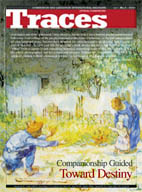
Traces N.5, May 2005
A Humanity that God Came to SaveOur time, and especially the century just passed, has always appealed to people’s desires. They all spoke of it–philosophers, doctors, politicians, salesmen, and advertisers–often exalting and at the same time impoverishing their meaning; or bending human desires to projects of domination, continually generating hostility and violence of all kinds.
Desire has been bandied about as the main key for interpreting the human soul. But often the word desire has been used to mean something else: automatic, instinctual drives; plans, dreams or utopias. Intentionally or not, this has led to much confusion.
By its very nature, desire is something the “I” has, like a space that it cannot, however, fill by its own efforts. You desire what you cannot achieve by yourself. It is a gap, a hunger and a thirst. And it has another characteristic: it is endless. Even when you come across an object that you have fixed on as the possible end of your desire, it still goes on. The great Italian poet Rebora said, “Whatever you may say or do there is a cry inside: that is not why, that is not why!”
So many schools of thought have clashed and quarreled over human desire, over what it is.
But, in the end, there is only one problem, as Leopardi understood all too well. Is the fact that life is so full, overflowing with such a desire for fulfillment, for happiness, the sign of a supreme error? Is it the sign that we are badly made? Or is it the first, tenuous but most certain sign that we are created for a journey that can be made?
The Christian announcement is often contested because it takes human desire “too seriously,” precisely because it does not consider it a sign of man’s error. But it places this desire at the beginning of the adventure of knowledge, of civilization, and–what most astonishes its opponents–of salvation; as the first step, which is renewed at every point of progress on our journey, in every circumstance or relationship; as the first hint of that humanity that God came to save at the price of His death, because no one would know what to do with a God who doesn’t save and doesn’t fulfill the greatest desire of the human heart–the desire that he be not made for death.
Benedict XVI witnesses to the world that the fulfillment of desire is a present reality, the Church, which prolongs in time God’s companionship to man. And this is why he sustains our hope.